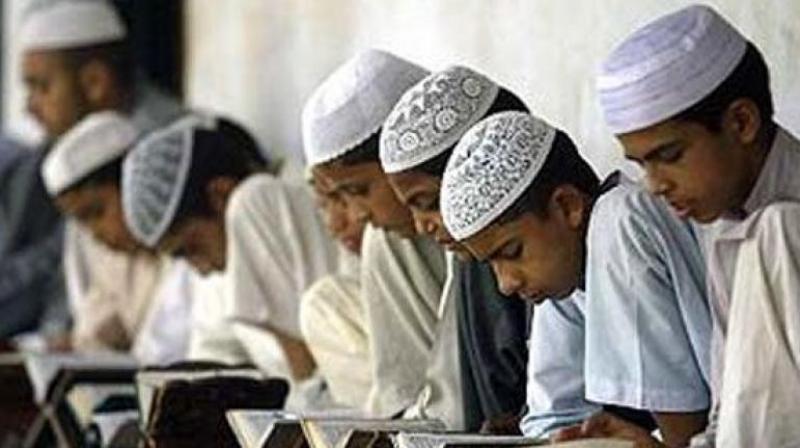Last Updated on October 21, 2024 5:48 pm by INDIAN AWAAZ
The National Commission for Protection of Child Rights (NCPCR) filed an affidavit in the Supreme Court in September challenging the Allahabad High Court’s decision to strike down the UP Board of Madarsa Education Act, 2004.
AMN / NEW DELHI
The Supreme Court today stayed the recommendation of the National Commission for Protection of Child Rights (NCPCR) to close down madrasas that are not compliant with the Right to Education (RTE) Act and consequent directions issued by the Centre and the Uttar Pradesh and Tripura governments.
The interim order was passed by a three-judge bench presided by Chief Justice of India D Y Chandrachud while hearing a plea by Jamiat Ulama-i-Hind which claimed that it affected the rights of religious minorities under Article 30 to impart education.

Issuing notice, the bench also comprising Justices J B Pardiwala and Manoj Misra directed, “Pending further orders, the communications dated June 7 and June 26, 2024, of the National Commission for the Protection of Child Rights and the consequential communications dated June 26, 2024, of the chief secretary of the state of Uttar Pradesh and the communication dated July 10, 2024, issued by the secretary, Department of Education and Literacy, Ministry of Education, Government of India, and August 28, 2024, issued by the Directorate of Elementary Education, Government of Tripura, shall not be acted upon”.
The June 7, 2024, NCPCR letter asked the UP chief secretary to withdraw the recognition of madrasas not complying with the RTE Act. In its June 25 letter, the Commission asked the Secretary, Department of Education & Literacy, Union Ministry of Education, to issue directions to all states and UTs to conduct inspections of the existing madrasas and to withdraw recognition of those which do not comply with RTE Act requirements.
States of UP, Tripura, and Bihar had so far acted on these letters with rampant harassment of Madrassas, asking them to virtually shut down and forcing their students to be enrolled in other schools, which have also been stayed, while also granting liberty to implead all States/UTs.
Jamiat Ulama-i-Hind was represented by Ms. Indira Jaising, Senior Advocate and Mr. Fuzail Ahmad Ayyubi, Advocate on Record.
Article 30(1) grants complete protection to minority educational institutions in the country, in addition to freedom of conscience under Article 25 and freedom to manage religious institutions under Article 26. The Hon’ble Supreme Court has repeatedly held that there can be no abrogation of this right and in 2014, a 5 Judge bench affirmed that the Right to Education Act, 2009 cannot be made applicable to educational institutions run by minorities. Even the RTE Act itself specifically exempts Madrassas and Vedic Pathshals from its application.
Despite the multiple protections, constitutional and statutory, the NCPCR has been issuing multiple communications targeting the Madrassas and their students, including unconstitutional objections to the non-muslims being enrolled in Madrassas.
Madrassas in this country have operated for centuries and akin to vedic pathshalas provide education to all classes of persons who seek their education. Notable reformers from all communities have received their elementary education at Madrassa in earlier times. The present onslaught of the NCPCR against the Madrassas is therefore not only uncalled for but is thoroughly unconstitutional.
The President of Jamiat Ulama-i-Hind, Maulana Arshad Madani, welcomed the Supreme Court’s decision and expressed hope that the final verdict will also be in favor of the Madrasas. He stated that those powers violating the mandates of the Constitution will face consequences. He expressed regret that there are various conspiracies underway to deprive the minorities of the special rights granted to them by the Constitution.
He stated that Article 30 (1) of the Constitution provides protection to all minority educational institutions, while Article 25 guarantees freedom of conscience and Article 26 grants minorities full autonomy in managing their religious educational institutions. The Supreme Court has consistently commented that there should be no interference in the rights granted to minorities under these articles.
Maulana Madani referred to the Supreme Court’s 2014 decision by a five-member bench, which stated that the Right to Education Act 2009 does not apply to educational institutions run by minorities. He unveiled the conspiracies against Islamic schools, asserting that those working against them are unaware of the environment and character of these institutions.
Maulana Madani further stated that the Right to Education Act, which is being used as a pretext to close and eliminate schools, explicitly states in Section 1(5) that no provision of the Act applies to madrasas, pathshalas, and similar educational institutions.
He stated that the Jamiat Ulama-i-Hind is connected to Islamic Madrasas, as all of its scholars have emerged from these institutions. In fact, the Jamiat is the voice and brain of madrasas. He emphasized that Sectarian forces are also ignorant of the history that these are Madrasas that when the entire nation was sleeping, they blew the horn to liberate the country from slavery.
Maulana Madani further said that they approached the Supreme Court to thwart this conspiracy and to protect the Constitution. He emphasized that if this conspiracy succeeds, the Constitution would lose its validity and become like a worthless book. He reiterated to the communalist forces that Islamic madrasas are being run within the framework of the country’s Constitution and laws, and it is through them that Islam is flourishing in the country.
Not only that, but the graduates of madrasas also illuminate the name of the country wherever they go through their character and work. However, it is unfortunate that the communalist mentality regarding madrasas is causing various problems for Muslims. Jamiat Ulama-i-Hind approached the court to exercise its constitutional and legal rights, and, Al Hamdulillah, a positive outcome has emerged, putting a stop to the conspiracies against madrasas.

